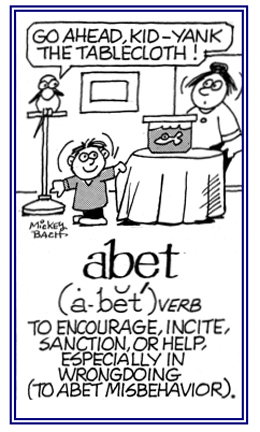2. To assist someone to do something; especially, something illegal: The robber was abetted by his brother who drove the get-a-way car away from the scene of the crime.
3. To assist someone to commit a crime, including planning the crime and helping the person to escape from the police, if it is necessary: It was amazing that, even though the head of the criminal gang was in jail, he was still able to abet his fellow conspirators in planning the bank robbery.
4. Etymology: from Old French abeter, "to incite, to tease," or "to bait another person".
Abet comes from the baiting of wild animals or the ancient sport of bear baiting, and the English language has now taken this violent word meaning and applied it to people rather than to animals.
This term goes far back to an old Teutonic origin that conjures up a picture of hardy men going to the chase with their packs of hunting dogs. Our English verb bite appeared long ago in a Low German derivative betan, meaning "to cause to bite, to make bite", as, to make dogs bite the bear, and so to send them out to hunt the bear.
Icelandic beita meant "to feed, to make bite", and also "to hunt" with dogs. The French adopted both the sport and the Teutonic name for it, making the Old French verb beter, meaning "to bait" a bear, and abeter, "to excite, to incite", which we have taken into English as abet. No longer applied to the hunt, it now means to encourage or to incite people, usually in an evil enterprise.

Go to this Word A Day Revisited Index
so you can see more of Mickey Bach's cartoons.
2. Etymology: This terminology is considered to be a lawyer's redundancy since abet means the same thing as aid, which gives credence to the old rumor that lawyers used to be paid by the word as illustrated by the following statements as shown below.
To help, assist, or to facilitate the commission of a crime, to promote the accomplishment thereof, to help in advancing or bringing it about, or to encourage, counsel, or to incite as to its commission.
Aid and abet includes all the assistance rendered by words, acts, encouragement, support, or presence, actual or constructive, to render assistance if necessary.
Legally, aiding and abetting describes any and all assistance rendered by words, acts, encouragement, support, or presence, actual or constructive, and to render assistance, if necessary; and are obviously derived from a combination of aid and abet:
- Aid means "to support, to help, to assist, or to strengthen".
- Act in cooperation with; to supplement the efforts of another person or other people.
- Distinguished from abet, aid within the aider and abettor statue means "to help, to assist", or "to strengthen"; while abet means "to counsel, to encourage, to incite, or to assist" in the commission of a criminal act.
